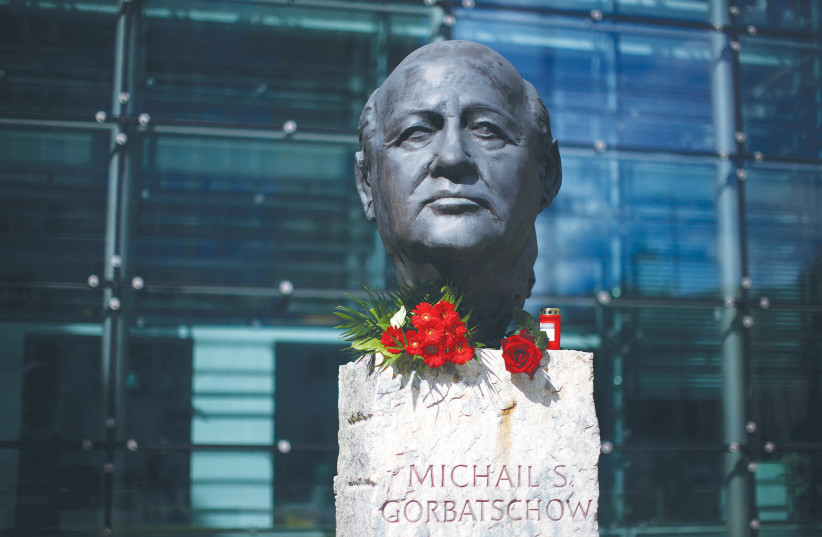History, argued Scottish historian Thomas Carlyle, “is but the biography of great men.”
An opposing school, represented among others by Karl Marx and Leo Tolstoy, thought history is shaped not by its heroes but by “objective forces.” Still, even they would agree that Mikhail Gorbachev, who died last week, shaped events in ways few others ever did.
Yes, determinists would argue that the communist idea, economy, and empire were anyhow dead, that there was no way to foot the bills of a Star-Wars competition with the US, and that Russia’s de facto occupation of myriad nationalities and lands had become untenable. Gorbachev, they will say, was merely there when what was anyhow ready to happen finally happened. They will be wrong.
Though he headed the Soviet Union for a mere six years, the last Soviet tsar withdrew from Afghanistan; ended the Cold War; felled the Berlin Wall; liberated the media; allowed democratic elections, first in Poland then elsewhere; exposed the communist economy’s ailments; and, for good measure, reconciled with Israel and let Soviet Jewry go.
It was a revolution, and it did not happen haphazardly. Gorbachev emerged early with the two concepts that comprised a gospel – the democratic glasnost and the economic perestroika – which added up to a brave admission that the system he inherited was gravely ill.

This much no one will be able to take away from him. He unmasked an evil empire’s ugly face, and x-rayed its rotten guts. It took all the candor, humanity and courage that his predecessors lacked.
Yes, there will be room to debate other actors’ roles in Gorbachev’s legacy, for instance, his foreign minister Eduard Shevardnadze’s instrumentality in ending the Cold War. Yet there will be no debating Gorbachev’s dominance in shaping the East Bloc’s future during the years of his leadership.
The debate about Gorbachev’s historical imprint will therefore not be about what happened during his incumbency, but about his impact on what followed it.
The same question will be asked about two other contemporary statesmen who were equally revolutionary and, arguably, equally failed: Israel’s Shimon Peres and South Africa’s F.W. de Klerk.
Comparing Russia's Mikhail Gorbachev, Israel's Shimon Peres, South Africa's F.W. de Klerk
INSPIRED BY the way Gorbachev had just ended the conflict between East and West, Peres set out, 29 years ago this month, to end the conflict between Israel and the Arab world, a conflict in which he was a key actor as the builder of Israel’s Defense Ministry, aerospace industry, and nuclear program.
Here, too, there will be much debate about other people’s contributions to the hero’s impact, from Yossi Beilin to Yitzhak Rabin, but there will be no debating Peres’s centrality. For better or worse, he formulated the New Middle East vision, drove its launch, and became identified with it more than anyone else.
The same is true for de Klerk.
The lawyer who had served the apartheid regime as minister of education, interior, welfare and energy stunned the world with his decision to bring that system to its end. There, too, historians will debate the extent to which someone else might have resisted the international system’s pressure and sustained the political system that the rest of the world abhorred.
Even so, there will be no arguing that de Klerk was the one who released Nelson Mandela from prison, legitimized him politically, and formed with him a partnership that marked one era’s end and another’s dawn, as South Africa became a democracy of all its citizens.
Fittingly, all three men received the Nobel Prize for Peace – Gorbachev in 1991, de Klerk in 1993, and Peres in 1994. And then came the unraveling.
DE KLERK’S project fell apart gradually but steadily, as South Africa became a celebration of lawlessness underscored by massive urban crime and topped by vast political corruption.
Peres’s project fell apart seven years after its launch, when his central peace project made way for the violence that, to this day, has yet to abate.
Gorbachev’s project collapsed in the most spectacular way. First, the Soviet Union fell apart, a development he never planned, and in fact staunchly opposed; then the economy he set out to reform was overtaken by robber barons; then the Russian democracy he inspired made way for autocracy; finally, and most tragically, Gorbachev’s biggest claim to historical heroism, the ending of the Cold War, came undone as a new Cold War flared between Russia and the West.
What, then, was it that overcame these three statesmen’s achievements, and what does it do to their status as heroes of history?
They were defeated by different things. De Klerk was overcome by the forces of chaos and Peres was overcome by the power of hatred. Gorbachev was defeated by nationalism.
The man who worked from Stalin’s former chambers understood that the Poles, the Hungarians, the Romanians, the Bulgarians and the rest of the former USSR’s satellites had to be released from Moscow’s tutelage. However, the man who was part Russian, part Ukrainian didn’t grasp the intensity with which Russia was hated within the USSR, from Lithuania to Georgia and beyond.
That is also why he didn’t appreciate some Russians’ hatred of the West with which he sought peace.
Those were failures of foresight of three statesmen whose vision of the future obscured their reading of the present. That is why all three were ultimately relegated by their countrymen to the political margins. The political forces they defied proved mightier than their historical greatness.
Even so, theirs was the kind of greatness that mankind so rarely meets and so frequently craves; the greatness of statesmen who refused to accept conflict as predestiny, and resolved to impose harmony on enmity, justice on evil, and peace on war.
www.MiddleIsrael.net
The writer, a Hartman Institute fellow, is the author of the bestselling Mitzad Ha’ivelet Ha’yehudi (The Jewish March of Folly, Yediot Sefarim, 2019), a revisionist history of the Jewish people’s political leadership.
